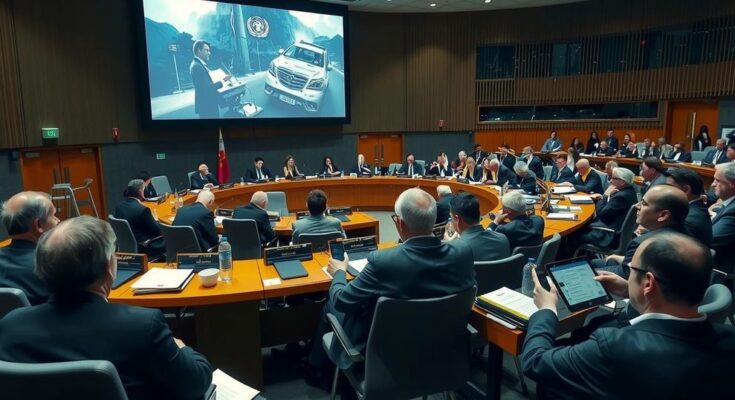The COP29 summit highlighted discussions between climate action and global peace, emphasizing the need for collective responsibility in addressing environmental crises while simultaneously fighting military spending and conflicts. Experts called for a transition to renewable energy and ecological practices, recognizing the interconnectedness of climate stability and human safety.
At the ongoing COP29 summit in Baku, discussions have shifted to encompass both climate finance and global peace, highlighting the interconnectedness of environmental stability and human safety. Notable gatherings led by Soka Gakkai International and various peace organizations examined how strategies for climate action can safeguard human lives and the natural world, particularly in light of escalating military expenditures and conflicts. Moderated by Lindsey Fielder Cook from the Quaker United Nations Office, experts addressed pressing questions around the effects of fossil fuel extraction and military financing on global peace, emphasizing that urgent reform is necessary to avoid exacerbating existing crises. The discourse included insights from Andrew Okem of the Intergovernmental Panel on Climate Change, advocating for substantial emissions reductions and a decisive transition to renewable energy to promote resilience against climate impacts. Moreover, Lucy Plummer of Soka Gakkai International urged attendees to acknowledge the critical need to mend humanity’s relationship with nature, insisting that a comprehensive understanding of this relationship is imperative for resolving the climate crisis. Dr. Duncan McLaren from UCLA School of Law discussed the geopolitical implications of carbon removal technologies, stressing the need for concerted efforts to achieve net-zero emissions while examining their potential in mitigating climate-related risks. Complementing the discussion, Harriet Mackaill-Hill from International Alert highlighted how climate change exacerbates conflict, stating it acts as a significant stressor on security in vulnerable regions. Contributors such as Deborah Burton noted the substantial environmental impact of military activities, disclosing that military operations contribute approximately 5.5 percent of global carbon emissions—surpassing emissions produced by several nations combined. Personal accounts from attendees like Shirine Jurdi of Lebanon reiterated that justice exists at the intersection of ecology and lasting peace, pointing towards the destructiveness of war on the environment and communities. Ultimately, the dialogue at COP29 significantly underscores the necessity for comprehensive climate action to ensure both environmental preservation and global stability, calling for a reallocation of resources towards ecological peacebuilding initiatives aimed at fostering thriving, sustainable communities.
The COP29 summit focuses heavily on addressing climate change through financial solutions aimed at reducing global temperatures and restoring ecological balance. Concurrently, delegates express deep concerns regarding global peace and stability, especially as military expenditures rise to unprecedented levels amid ongoing conflicts. This convergence of climate and peace discussions seeks to explore integrated approaches that promote both environmental sustainability and human safety in a globally interconnected manner.
In summary, the discussions at COP29 reveal an urgent need to address the dual crises of climate change and global conflict through interconnected strategies. By aligning climate action with peace-building efforts, delegates advocate for transformative pathways that not only safeguard the planet but also nurture human security. The consensus underscores the importance of recognizing our shared responsibility towards fostering a peaceful coexistence with nature, thus enabling a sustainable future for all.
Original Source: www.ipsnews.net




